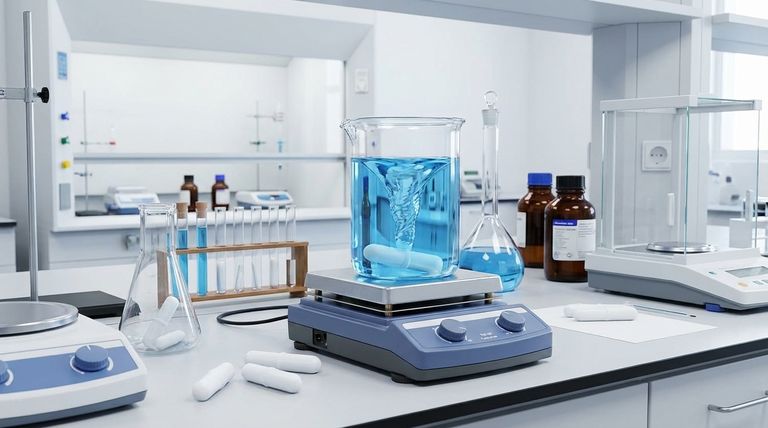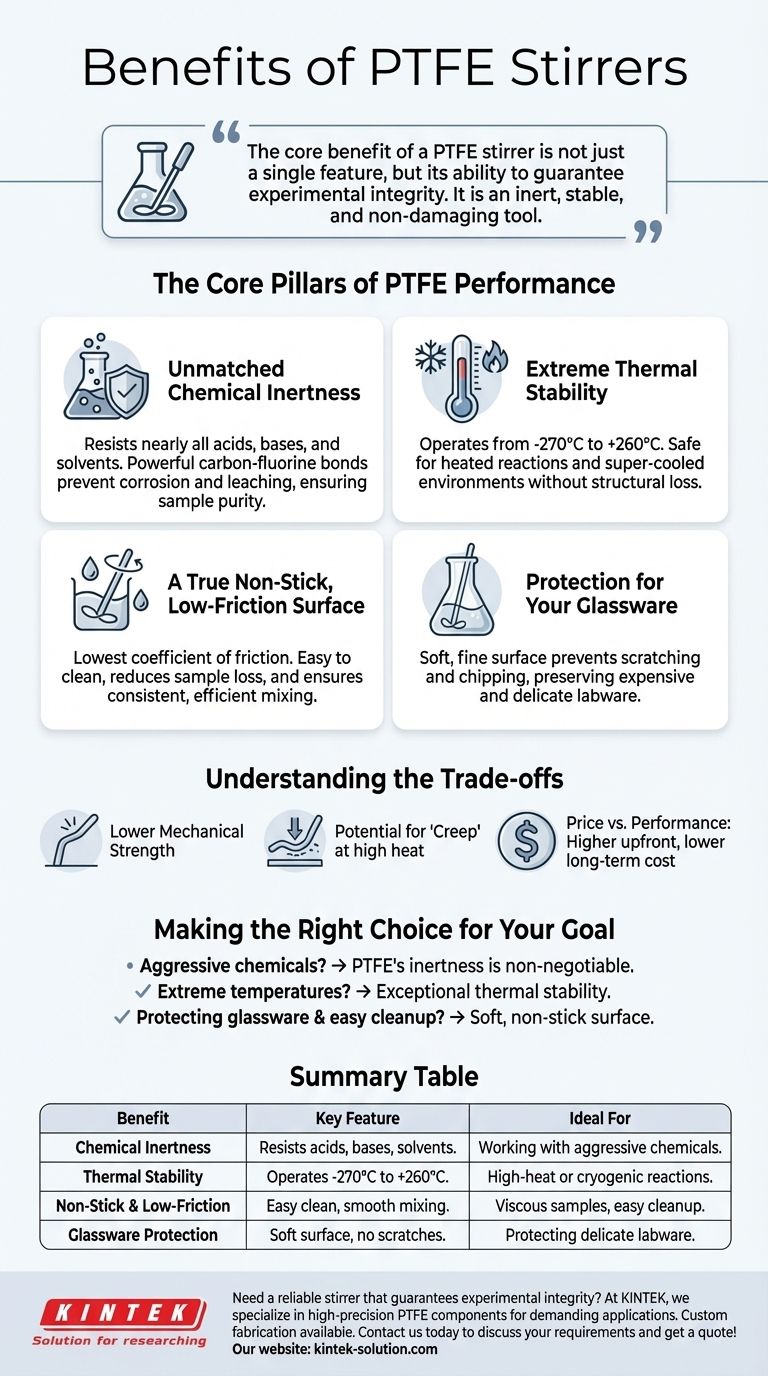In short, PTFE is the material of choice for stirrers due to its unparalleled chemical resistance, high-temperature stability, and extremely low-friction surface. This unique combination ensures the stirrer will not react with your solution, degrade under heat, or damage your glassware, making it a reliable default for demanding scientific applications.
The core benefit of a PTFE stirrer is not just a single feature, but its ability to guarantee experimental integrity. It is an inert, stable, and non-damaging tool that allows you to trust that your results are not influenced by contamination from or a reaction with the stirrer itself.

The Core Pillars of PTFE Performance
Polytetrafluoroethylene (PTFE), commonly known by its brand name Teflon, possesses a set of properties that make it uniquely suited for laboratory stirring equipment. Understanding these pillars clarifies why it is so widely used.
Unmatched Chemical Inertness
PTFE is resistant to nearly all chemicals, including aggressive acids, bases, and organic solvents. This property is fundamental to its role in a lab.
The reason for this resilience lies in the powerful carbon-fluorine bonds that make up its molecular structure. This stability means the stirrer will not corrode, dissolve, or leach unwanted substances into your sample, ensuring the purity of your experiment.
Extreme Thermal Stability
PTFE stirrers can operate across an exceptionally wide temperature range, often cited from cryogenic lows around -270°C up to a continuous working temperature of +260°C (+500°F).
This allows them to be used safely in both heated reactions on a hot plate and in super-cooled environments without becoming brittle, melting, or losing their structural integrity.
A True Non-Stick, Low-Friction Surface
PTFE has one of the lowest coefficients of friction of any solid material. This manifests in two critical ways for a stirrer.
First, its non-stick (hydrophobic and oleophobic) surface makes it incredibly easy to clean and reduces sample loss, as viscous materials do not readily adhere to it. Second, the low friction allows for smooth, efficient rotation within the vessel, promoting consistent mixing.
Protection for Your Glassware
Unlike stirrers made from harder materials like glass or metal, PTFE is relatively soft and has a fine surface finish.
This quality is crucial for protecting expensive and delicate glass beakers, flasks, and reactors. A PTFE stirrer will not scratch or chip the interior of the vessel during operation, preserving the lifespan and integrity of your labware.
Understanding the Trade-offs
While PTFE is an exceptional material, no single solution is perfect for every scenario. An objective assessment requires acknowledging its limitations.
Lower Mechanical Strength
Compared to stainless steel or glass, PTFE is a softer material. It has excellent flexural strength (it can bend without breaking) but is not suited for high-load applications that require extreme rigidity or abrasion resistance.
Potential for "Creep"
Under a sustained mechanical load, especially at elevated temperatures, PTFE can be subject to "creep"—a tendency to slowly and permanently deform over time. For most standard stir bar applications, this is not a concern.
Price vs. Performance
While PTFE offers an excellent price-to-performance ratio, its upfront cost may be higher than simpler alternatives like a glass stirring rod. However, its durability and versatility often make it more cost-effective over the long term.
Making the Right Choice for Your Goal
Selecting the right equipment is about matching the tool to the task. PTFE's benefits make it the clear choice for specific, common laboratory needs.
- If your primary focus is working with aggressive chemicals: PTFE's inertness is non-negotiable for preventing sample contamination and stirrer degradation.
- If your primary focus is conducting reactions at extreme temperatures: The material's exceptional thermal stability ensures it remains a reliable, non-reactive tool from cryogenic to high-heat conditions.
- If your primary focus is protecting delicate glassware and ensuring easy cleanup: The soft, non-stick surface of PTFE is superior to metal or glass for preventing scratches and residue buildup.
Ultimately, choosing a PTFE stirrer is an investment in the reliability and integrity of your work.
Summary Table:
| Benefit | Key Feature | Ideal For |
|---|---|---|
| Chemical Inertness | Resists nearly all acids, bases, and solvents. | Working with aggressive chemicals to prevent contamination. |
| Thermal Stability | Operates from -270°C to +260°C. | High-heat or cryogenic reactions. |
| Non-Stick & Low-Friction | Easy to clean and ensures smooth mixing. | Viscous samples and easy cleanup. |
| Glassware Protection | Soft surface prevents scratches and chips. | Protecting expensive and delicate glassware. |
Need a reliable stirrer that guarantees experimental integrity?
At KINTEK, we specialize in manufacturing high-precision PTFE components, including stirrers, seals, liners, and labware. Our products are designed for the demanding environments of semiconductor, medical, laboratory, and industrial applications.
We offer custom fabrication from prototypes to high-volume orders, ensuring you get the exact solution for your specific needs. Protect your experiments and your equipment with stirrers you can trust.
Contact us today to discuss your requirements and get a quote!
Visual Guide

Related Products
- Custom PTFE Teflon Parts Manufacturer PTFE Magnetic Stirring Bar
- Custom PTFE Parts Manufacturer for Teflon Parts and PTFE Tweezers
- Custom PTFE Parts Manufacturer for Teflon Containers and Components
- Custom PTFE Measuring Cylinders for Advanced Scientific and Industrial Applications
- PTFE Chemical Solvent Sampling Spoon
People Also Ask
- What additional advantages does PTFE offer for laboratory use? Maximize Purity and Reliability
- How does the manufacturer's reputation and quality assurance impact the choice of a PTFE-coated septum? Ensure Data Integrity
- What are some specialized PTFE stirring bars available? Optimize Your Lab Mixing Efficiency
- What are the primary uses of PTFE silicone septa? Ensure Sample Integrity in GC/LC Analysis
- What are some specific applications of PTFE shovels in the laboratory? Ensure Sample Purity and Safety
- What are the key properties that make PTFE shovels ideal for laboratory use? Ensure Sample Integrity with Chemically Inert Tools
- What are the applications of PTFE-lined bottle caps? Ensure Ultimate Purity and Chemical Resistance
- What are the benefits of colored PTFE caps? Boost Lab Safety and Efficiency with Visual Coding



















